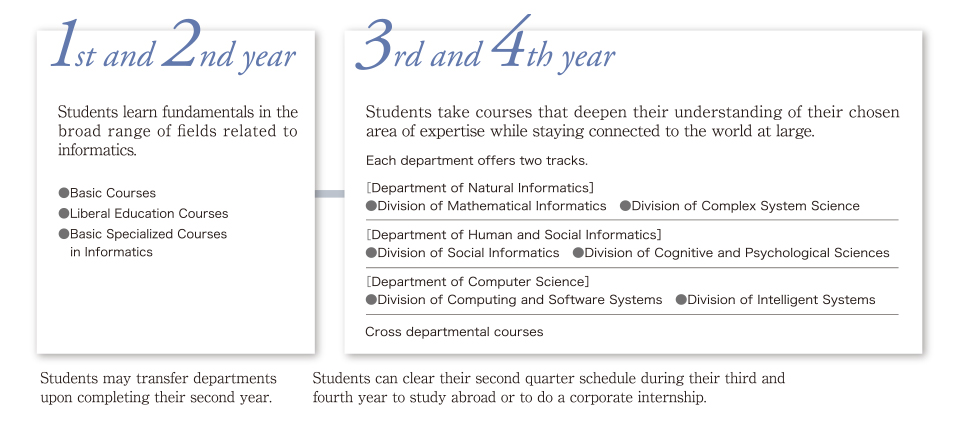
Curriculum
■New quarter system
(Each academic year consists of four quarters)

■Curriculum contents
| First and second year | Third and fourth year |
|---|---|
| Basic Courses ・Basic General Education Courses ・Basic Courses in Humanities and Social Sciences ・Basic Courses in Natural Sciences |
Each department offers two tracks Department of Natural Informatics ・Division of Mathematical Informatics ・Division of Complex System Science Department of Human and Social Informatics ・Division of Social Informatics ・Division of Cognitive and Psychological Sciences Department of Computer Science ・Division of Computing and Software Systems ・Division of Intelligent Systems |
| Liberal Education Courses ・Liberal Education Courses in General Education ・Liberal Education Courses in Humanities and Social Sciences ・Liberal Education Courses in Natural Sciences |
|
| Basic Specialized Courses in Informatics ・Basic Specialized Courses in Information Science and Technology ・Basic Specialized Courses in Natural and Social Systems ・Basic Specialized Courses in Logical Problem Solving |
Cross-departmental courses ・Subjects for interaction with society |
Department transfers
We offer a flexible curriculum structure that allows students to transfer to a different department between their second and third years should their interests change while they are still learning the foundations of their area of expertise.
Study abroad programs
Select from a number of exchange programs depending on purpose and destination, from using a longer break to a few weeks, a semester or even a year.
■Study abroad programs
- 1.Exchange programs
- With places to study at over 180 institutions around the globe and three opportunities to sign up each year (June, October, January)
Exchange period: from 1 semester to 1 year
Locations: Asia, North America, Europe, Australia and other connected universities, graduate schools and research institutions all over the world. More than 180 institutions. - 2.Short study programs
- Programs for studying with cooperating universities during extended breaks.
Select one based on your needs (language studies/internship)
Exchange period: from a few weeks to about 1 month
Locations:USA, UK, Indonesia, Australia, Thailand, etc.
■Exchange support
In the International Exchange Department of the International Education and Exchange Center there are specialized instructors to give exchange guidance, make plans for strategic language lessons and orientation before your departure (travel insurance, travel preparations, risk management).
Internships with industry
It is possible to participate in practicums through internships in industry or with cooperation from businesses. This is an accepted unit of study as Project Based Learning (PBL) for interaction with society by meeting certain conditions including the period and content.
Graduate school placement
- Graduate School of Informatics
- Many students go on to graduate studies to learn in advanced fields and gain a broader view of society.
(1)Department of Mathematical Informatics(2)Department of Complex Systems Science(3)Department of Social Informatics
(4)Department of Cognitive and Psychological Sciences(5)Department of Computing and Software Systems(6)Department of Intelligent Systems
<Others go on to the Graduate School of Environmental Studies>
As a graduate school fusing liberal arts and sciences, the Graduate School of Environmental Studies offers three specializations: Earth and Environmental Sciences, Environmental
Key employers
Students with a background in informatics are needed in all kinds of fields. While they can certainly enter the information and communications sector, they can also make their mark across a broad sampling of leading corporations working in a variety of industries.
- Information and electronics
- Hitachi, Mitsubishi Electric, Toshiba, Fujitsu, NEC, Panasonic, Sony, NTT Data, SCSK
- Communications
- NTT, NTT DoCoMo, KDDI, Softbank
- Automotive
- Toyota Motor, Nissan Motor, Honda Motor, Denso, Aisin AW, Toyota Industries
- Machinery
- Mitsubishi Heavy Industries, Yamaha, Ricoh
- Energy
- TEPCO, Chubu Electric Power, Toho Gas
- Transport
- JR Central, NEXCO Central Japan
- Finance
- Bank of Tokyo-Mitsubishi UFJ, Tokio Marine Nichido
- Major media outlets
- NHK, Nikkei Shimbun, Chunichi Shimbun, Tokai Television
- Other
- Amazon Japan, Nomura Research Institute, Dentsu
- Public sector
- Aichi Prefecture, Tokyo Prefecture, Nagoya City
- Universities
- Nagoya University
※ Graduate placements from School of Informatics and Sciences and Information Engineering Course of Department of Electrical and Electronic Engineering and Information Engineering in School of Engineering through the 2015 academic year.
